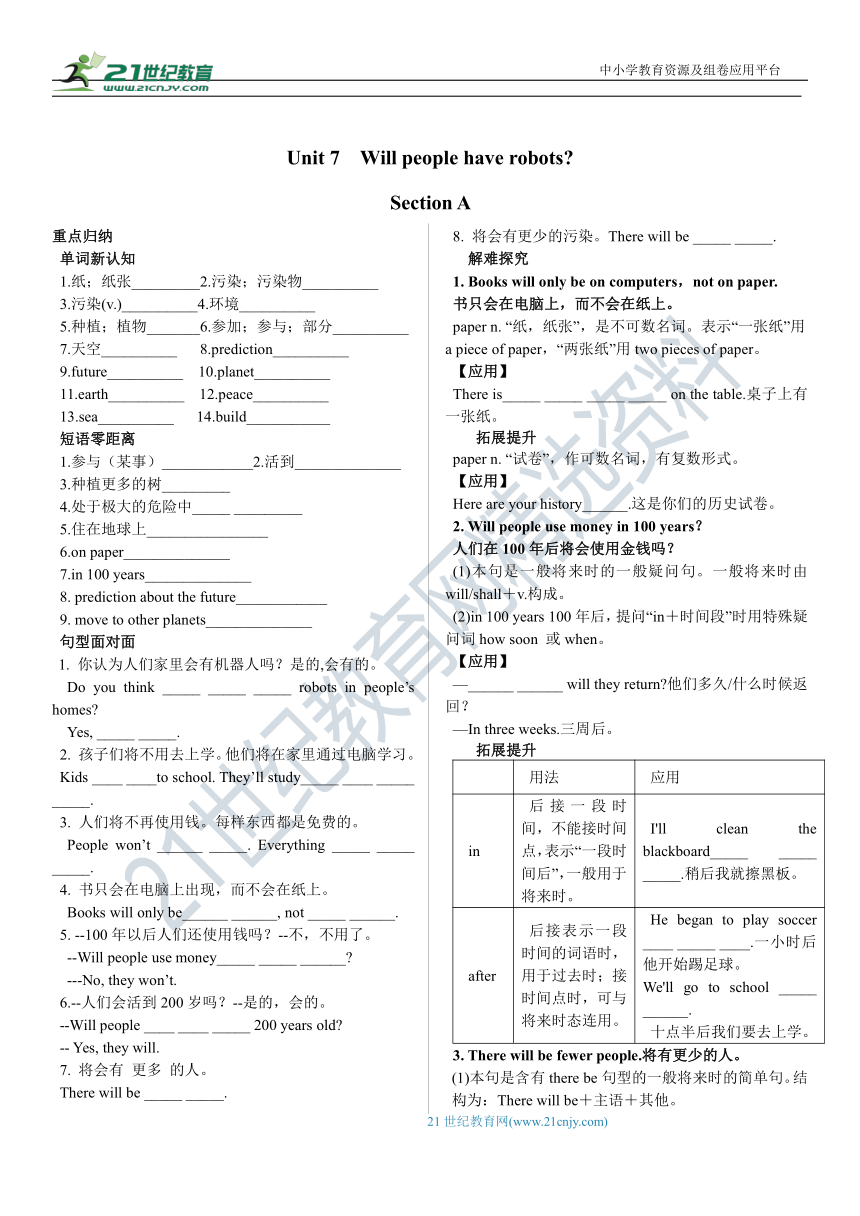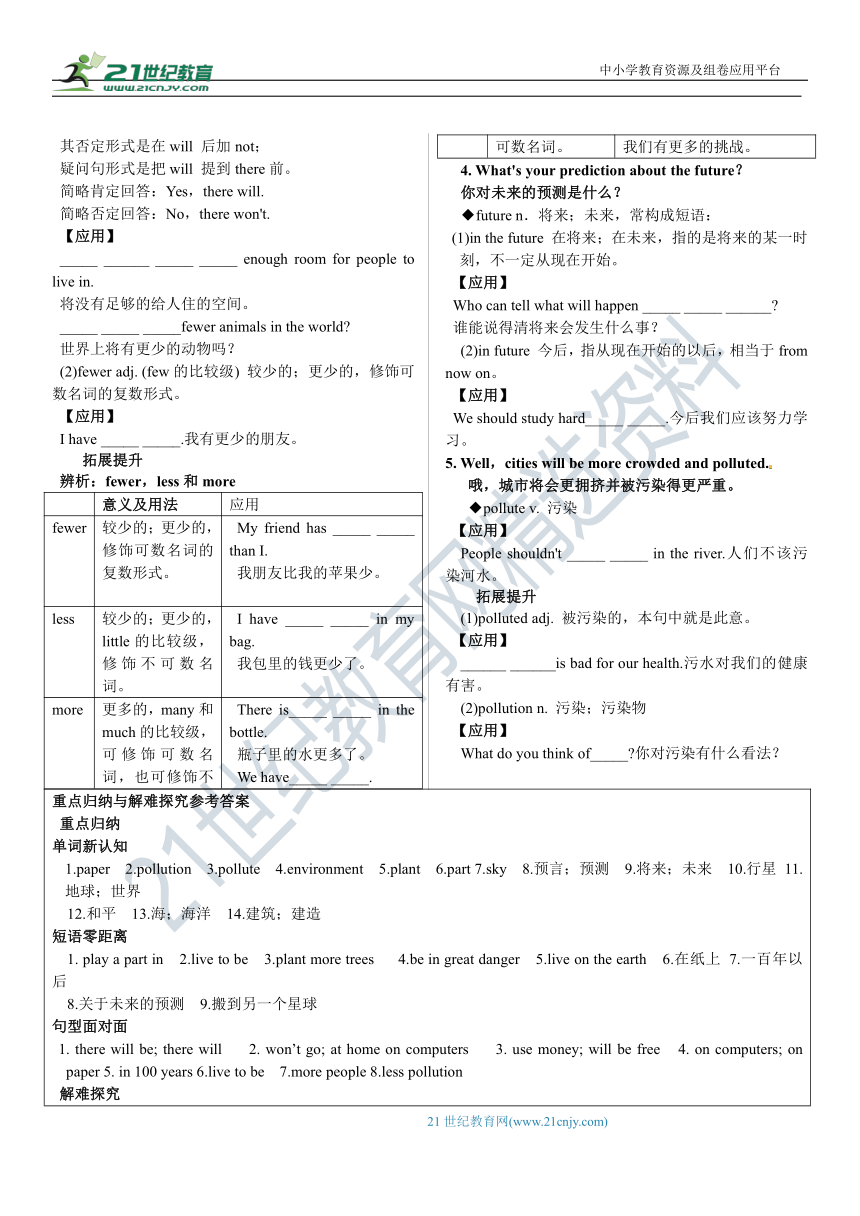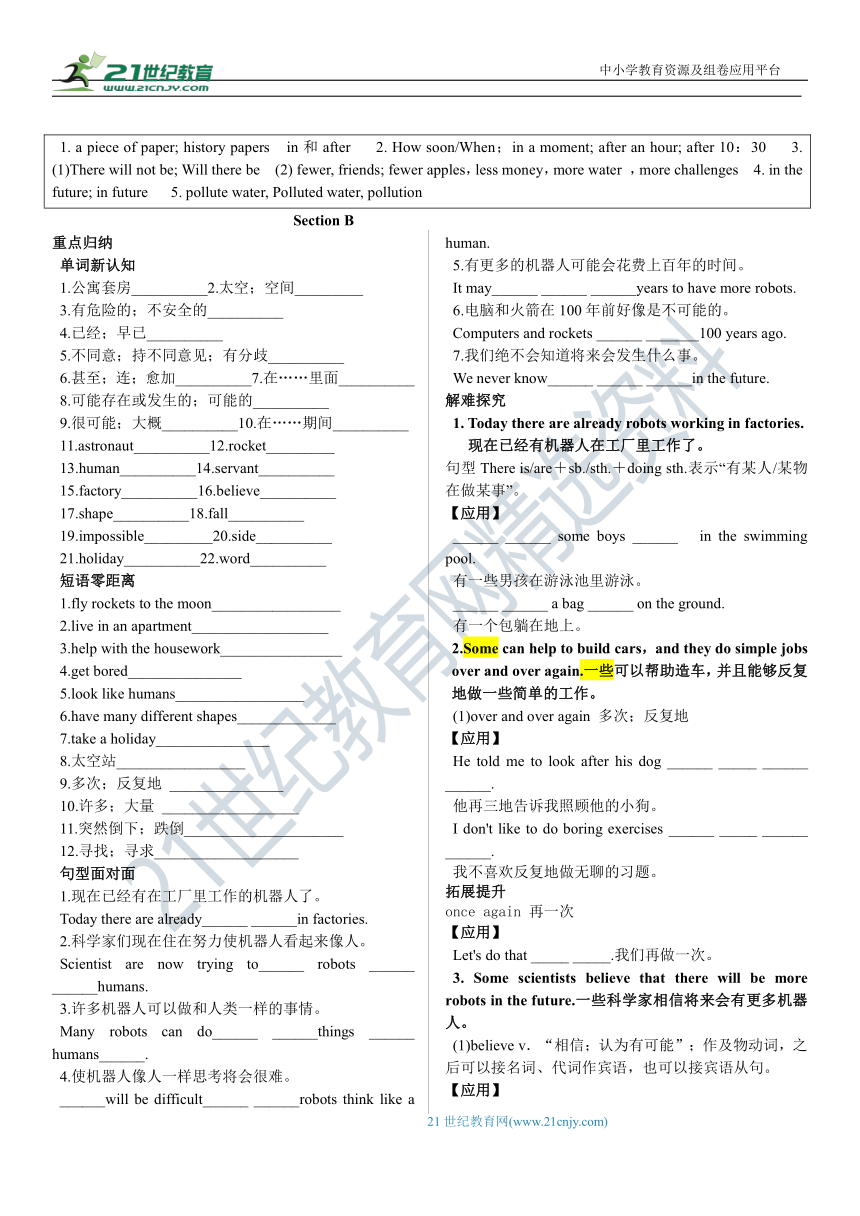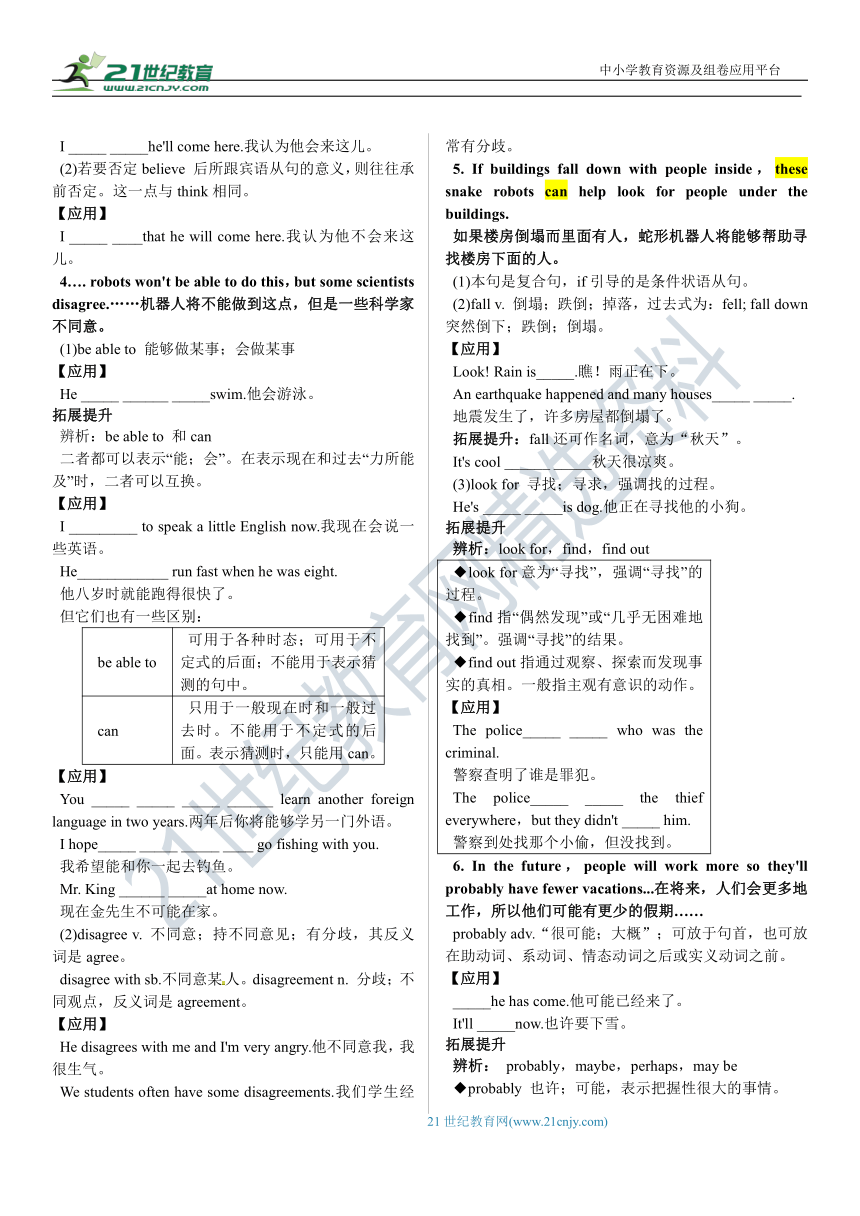人教八上Unit 7 Will people have robots重点归纳与解难探究(含答案)
文档属性
| 名称 | 人教八上Unit 7 Will people have robots重点归纳与解难探究(含答案) |  | |
| 格式 | zip | ||
| 文件大小 | 2.1MB | ||
| 资源类型 | 试卷 | ||
| 版本资源 | 人教新目标(Go for it)版 | ||
| 科目 | 英语 | ||
| 更新时间 | 2018-11-28 07:08:12 | ||
图片预览




文档简介
中小学教育资源及组卷应用平台
Unit 7 Will people have robots?
Section A
重点归纳
单词新认知
1.纸;纸张_________2.污染;污染物__________
3.污染(v.)__________4.环境__________
5.种植;植物_______6.参加;参与;部分__________
7.天空__________ 8.prediction__________
9.future__________ 10.planet__________
11.earth__________ 12.peace__________
13.sea__________ 14.build___________
短语零距离
1.参与(某事)____________2.活到______________
3.种植更多的树_________
4.处于极大的危险中_____ _________
5.住在地球上________________
6.on paper______________
7.in 100 years______________
8. prediction about the future____________
9. move to other planets______________
句型面对面
1. 你认为人们家里会有机器人吗?是的,会有的。
Do you think _____ _____ _____ robots in people’s homes?
Yes, _____ _____.
2. 孩子们将不用去上学。他们将在家里通过电脑学习。
Kids ____ ____to school. They’ll study_____ ____ _____ _____.
3. 人们将不再使用钱。每样东西都是免费的。
People won’t ______ _____. Everything _____ _____ _____.
4. 书只会在电脑上出现,而不会在纸上。
Books will only be______ ______, not _____ ______.
5. --100年以后人们还使用钱吗?--不,不用了。
--Will people use money_____ _____ ______?
---No, they won’t.
6.--人们会活到200岁吗?--是的,会的。
--Will people ____ ____ _____ 200 years old?
-- Yes, they will.
7. 将会有 更多 的人。
There will be _____ _____.
8. 将会有更少的污染。There will be _____ _____.
解难探究
1. Books will only be on computers,not on paper.
书只会在电脑上,而不会在纸上。
paper n. “纸,纸张”,是不可数名词。表示“一张纸”用a piece of paper,“两张纸”用two pieces of paper。
【应用】
There is_____ _____ _____ _____ on the table.桌子上有一张纸。
拓展提升
paper n. “试卷”,作可数名词,有复数形式。
【应用】
Here are your history______.这是你们的历史试卷。
2. Will people use money in 100 years?
人们在100年后将会使用金钱吗?
(1)本句是一般将来时的一般疑问句。一般将来时由will/shall+v.构成。
(2)in 100 years 100年后,提问“in+时间段”时用特殊疑问词how soon 或when。
【应用】
—______ ______ will they return?他们多久/什么时候返回?
—In three weeks.三周后。
拓展提升
用法 应用
in 后接一段时间,不能接时间点,表示“一段时间后”,一般用于将来时。 I'll clean the blackboard_____ _____ _____.稍后我就擦黑板。
after 后接表示一段时间的词语时,用于过去时;接时间点时,可与将来时态连用。 He began to play soccer ____ _____ ____.一小时后他开始踢足球。 We'll go to school _____ ______. 十点半后我们要去上学。
3. There will be fewer people.将有更少的人。
(1)本句是含有there be句型的一般将来时的简单句。结构为:There will be+主语+其他。
其否定形式是在will 后加not;
疑问句形式是把will 提到there前。
简略肯定回答:Yes,there will.
简略否定回答:No,there won't.
【应用】
_____ ______ _____ _____ enough room for people to live in.
将没有足够的给人住的空间。
_____ _____ _____fewer animals in the world?
世界上将有更少的动物吗?
(2)fewer adj. (few的比较级) 较少的;更少的,修饰可数名词的复数形式。
【应用】
I have _____ _____.我有更少的朋友。
拓展提升
辨析:fewer,less和more
意义及用法 应用
fewer 较少的;更少的,修饰可数名词的复数形式。 My friend has _____ _____ than I. 我朋友比我的苹果少。
less 较少的;更少的,little的比较级,修饰不可数名词。 I have _____ _____ in my bag. 我包里的钱更少了。
more 更多的,many和much的比较级,可修饰可数名词,也可修饰不可数名词。 There is_____ _____ in the bottle. 瓶子里的水更多了。 We have_____ _____. 我们有更多的挑战。
4. What's your prediction about the future?
你对未来的预测是什么?
◆future n.将来;未来,常构成短语:
(1)in the future 在将来;在未来,指的是将来的某一时刻,不一定从现在开始。
【应用】
Who can tell what will happen _____ _____ ______?
谁能说得清将来会发生什么事?
(2)in future 今后,指从现在开始的以后,相当于from now on。
【应用】
We should study hard_____ _____.今后我们应该努力学习。
5. Well,cities will be more crowded and polluted.
哦,城市将会更拥挤并被污染得更严重。
◆pollute v. 污染
【应用】
People shouldn't _____ _____ in the river.人们不该污染河水。
拓展提升
(1)polluted adj. 被污染的,本句中就是此意。
【应用】
______ ______is bad for our health.污水对我们的健康有害。
(2)pollution n. 污染;污染物
【应用】
What do you think of_____?你对污染有什么看法?
重点归纳与解难探究参考答案 重点归纳 单词新认知1.paper 2.pollution 3.pollute 4.environment 5.plant 6.part 7.sky 8.预言;预测 9.将来;未来 10.行星 11.地球;世界 12.和平 13.海;海洋 14.建筑;建造短语零距离1. play a part in 2.live to be 3.plant more trees 4.be in great danger 5.live on the earth 6.在纸上 7.一百年以后 8.关于未来的预测 9.搬到另一个星球 句型面对面1. there will be; there will 2. won’t go; at home on computers 3. use money; will be free 4. on computers; on paper 5. in 100 years 6.live to be 7.more people 8.less pollution解难探究1. a piece of paper; history papers in和after 2. How soon/When;in a moment; after an hour; after 10:30 3. (1)There will not be; Will there be (2) fewer, friends; fewer apples,less money,more water ,more challenges 4. in the future; in future 5. pollute water, Polluted water, pollution
Section B
重点归纳
单词新认知
1.公寓套房__________2.太空;空间_________
3.有危险的;不安全的__________
4.已经;早已__________
5.不同意;持不同意见;有分歧__________
6.甚至;连;愈加__________7.在……里面__________
8.可能存在或发生的;可能的__________
9.很可能;大概__________10.在……期间__________
11.astronaut__________12.rocket_________
13.human__________14.servant__________
15.factory__________16.believe__________
17.shape__________18.fall__________
19.impossible_________20.side__________
21.holiday__________22.word__________
短语零距离
1.fly rockets to the moon_________________
2.live in an apartment__________________
3.help with the housework________________
4.get bored_______________
5.look like humans_________________
6.have many different shapes_____________
7.take a holiday_______________
8.太空站_________________
9.多次;反复地 _______________
10.许多;大量 __________________
11.突然倒下;跌倒_____________________
12.寻找;寻求___________________
句型面对面
1.现在已经有在工厂里工作的机器人了。
Today there are already______ ______in factories.
2.科学家们现在住在努力使机器人看起来像人。
Scientist are now trying to______ robots ______ ______humans.
3.许多机器人可以做和人类一样的事情。
Many robots can do______ ______things ______ humans______.
4.使机器人像人一样思考将会很难。
______will be difficult______ ______robots think like a human.
5.有更多的机器人可能会花费上百年的时间。
It may______ ______ ______years to have more robots.
6.电脑和火箭在100年前好像是不可能的。
Computers and rockets ______ _______100 years ago.
7.我们绝不会知道将来会发生什么事。
We never know______ ______ ______in the future.
解难探究
1. Today there are already robots working in factories.
现在已经有机器人在工厂里工作了。
句型There is/are+sb./sth.+doing sth.表示“有某人/某物在做某事”。
【应用】
______ ______ some boys ______ in the swimming pool.
有一些男孩在游泳池里游泳。
______ ______ a bag ______ on the ground.
有一个包躺在地上。
2.Some can help to build cars,and they do simple jobs over and over again.一些可以帮助造车,并且能够反复地做一些简单的工作。
(1)over and over again 多次;反复地
【应用】
He told me to look after his dog ______ _____ ______ ______.
他再三地告诉我照顾他的小狗。
I don't like to do boring exercises ______ _____ ______ ______.
我不喜欢反复地做无聊的习题。
拓展提升
once again 再一次
【应用】
Let's do that _____ _____.我们再做一次。
3. Some scientists believe that there will be more robots in the future.一些科学家相信将来会有更多机器人。
(1)believe v.“相信;认为有可能”;作及物动词,之后可以接名词、代词作宾语,也可以接宾语从句。
【应用】
I _____ _____he'll come here.我认为他会来这儿。
(2)若要否定believe 后所跟宾语从句的意义,则往往承前否定。这一点与think相同。
【应用】
I _____ ____that he will come here.我认为他不会来这儿。
4…. robots won't be able to do this,but some scientists disagree.……机器人将不能做到这点,但是一些科学家不同意。
(1)be able to 能够做某事;会做某事
【应用】
He _____ ______ _____swim.他会游泳。
拓展提升
辨析:be able to 和can
二者都可以表示“能;会”。在表示现在和过去“力所能及”时,二者可以互换。
【应用】
I _________ to speak a little English now.我现在会说一些英语。
He____________ run fast when he was eight.
他八岁时就能跑得很快了。
但它们也有一些区别:
be able to 可用于各种时态;可用于不定式的后面;不能用于表示猜测的句中。
can 只用于一般现在时和一般过去时。不能用于不定式的后面。表示猜测时,只能用can。
【应用】
You _____ _____ _____ ______ learn another foreign language in two years.两年后你将能够学另一门外语。
I hope_____ _____ _____ ____ go fishing with you.
我希望能和你一起去钓鱼。
Mr. King ______ _____at home now.
现在金先生不可能在家。
(2)disagree v. 不同意;持不同意见;有分歧,其反义词是agree。
disagree with sb.不同意某人。disagreement n. 分歧;不同观点,反义词是agreement。
【应用】
He disagrees with me and I'm very angry.他不同意我,我很生气。
We students often have some disagreements.我们学生经常有分歧。
5. If buildings fall down with people inside,these snake robots can help look for people under the buildings.
如果楼房倒塌而里面有人,蛇形机器人将能够帮助寻找楼房下面的人。
(1)本句是复合句,if引导的是条件状语从句。
(2)fall v. 倒塌;跌倒;掉落,过去式为:fell; fall down 突然倒下;跌倒;倒塌。
【应用】
Look! Rain is_____.瞧!雨正在下。
An earthquake happened and many houses_____ _____.
地震发生了,许多房屋都倒塌了。
拓展提升:fall还可作名词,意为“秋天”。
It's cool ______ _____秋天很凉爽。
(3)look for 寻找;寻求,强调找的过程。
He's _____ _____is dog.他正在寻找他的小狗。
拓展提升
辨析:look for,find,find out
◆look for意为“寻找”,强调“寻找”的过程。◆find指“偶然发现”或“几乎无困难地找到”。强调“寻找”的结果。◆find out指通过观察、探索而发现事实的真相。一般指主观有意识的动作。【应用】The police_____ _____ who was the criminal.警察查明了谁是罪犯。 The police_____ _____ the thief everywhere,but they didn't _____ him.警察到处找那个小偷,但没找到。
6. In the future,people will work more so they'll probably have fewer vacations...在将来,人们会更多地工作,所以他们可能有更少的假期……
probably adv.“很可能;大概”;可放于句首,也可放在助动词、系动词、情态动词之后或实义动词之前。
【应用】
_____he has come.他可能已经来了。
It'll _____now.也许要下雪。
拓展提升
辨析: probably,maybe,perhaps,may be
◆probably 也许;可能,表示把握性很大的事情。
◆maybe或许;大概,把握性比probably小,相当于perhaps。常放于句首。【应用】
______he is right.或许他是对的。
◆may be 可能是,是情态动词may+be,常用作谓语动词。
【应用】_____he is a doctor.=He _____ _____a doctor.
他可能是一名医生。
重点归纳与解难探究参考答案 重点归纳 单词新认知1.apartment 2.space 3.dangerous 4.already 5.disagree 6.even 7.inside 8.possible 9.probably 10.during 11.宇航员;航天员 12.火箭 13.人的;人本性的;人 14.仆人 15.工厂 16.相信;认为有可能 17.外形;形状 18.倒塌;跌倒;掉落 19.不可能存在或发生的;不可能的 20.一方(的意见、态度、立场) 21.假期;假日 22.单词;词短语零距离1.乘火箭去月球 2.住在一所公寓里 3.帮忙做家务 4.变得无聊 5.看起来像人 6.有许多不同的形状 7.度假8.space station 9.over and over again 10.hundreds of 11.fall down 12.look for句型面对面1.robots working 2.make; look like 3.the same; as; do 4.It; to make 5.take hundreds of 6.seemed impossible 7.What will happen 解难探究1. There are, swimming; There is, lying 2.(1) over and over again; over and over again (2)once again 3.(1) believe that (2)don't believe4. is able to; can/am able to; was able to/could; will be able to; to be able to; can't be 5.(2)falling; fell down; in fall (3) looking for; found out, looked for, find 6. Probably,probably;Maybe/Perhaps,Maybe may be
专题突破
语法透析(分级精练篇语法专项过关练习见P)
一般将来时
现在 将来
◆ 概念:
一般将来时是表示将来某个时间要发生的动作或存在的状态。
【应用】
My brother ______ _____ a football match on TV this evening.
我弟弟今天晚上将在电视上观看一场足球比赛。
◆构成及句式:
一、构成:
一般将来时是由"will / shall +动词原形"构成的。shall只限于第一人称,主要见于英国英语,现在的趋势是第一、二、三人称的单复数形式均用will表示。在口语中,shall和will常缩写成"’ll",紧接在主语之后。
二、句式:
其否定式shall not和will not的简略式分别为shan’t或won’t。 I shall go and shut the door. 我去关门。
When will you know your exam results? 你什么时候能知道考试结果?
三、疑问句:
把 will / shall提到主要之前;简略肯定回答:Yes, 主语+will / shall;简略否定回答:No, 主语+won’t/shan’t.)
【应用】
He ____ ____ to school this afternoon.今天下午他不去上学了。
—_____ _____visit her grandma next weekend?
下个周末她去探望她的祖母吗?
—Yes,she will./No,she won't.是的,她去。/不,她不去。
◆时间状语:
这一时态常用的时间状语有:tomorrow(morning,afternoon,evening),next time,in a month,from now on,soon 等。
【应用】
I'll be more careful _____ _____ ____.从现在起我会更加小心的。
◆一般将来时的其他形式:
1.“be going to+动词原形”可表示将来,用来表示近期将要发生的动作或存在的状态,以及计划、安排、打算要做的事。其中be有人称和数的变化。
【应用】We _____ _____ ____ pick apples next week.
下周我们打算去摘苹果。
2.某些动词如come,leave的现在进行时也可表示将来,通常表示已安排好的活动或事情。
【应用】He ______ _____ for Shanghai tomorrow.
他明天要出发去上海。
单元写作
写作素材
本单元的写作要求是对未来生活的变化进行描述。写此类文章需要注意以下事项:
1.要在“变化”上下工夫,什么样的变化、变化的程度等;且时态多为一般将来时。如果与以前作比较,还可用过去时;如果与现在作比较,可用现在时。
2.注意基本功的训练,力求语法正确、用词得当、语言地道。单词拼写、标点符号以及书写也是不容忽视的。
常用短语、句型:
1.live to do 200 years old活动200岁 2.free time空闲时间
3.in danger处于危险之中
4.on the earth在地球上
5.play a part in sth.参与某事
6.look for寻找
7.in the future在未来
8.hundreds of许多;成百上千
9. the same…as…与……一样
10.over and over again多次;反复地
11. will+动词原形 将要做……
12.fewer/more+可数名词复数 更少/更多……
13.less/more+不可数名词 更少/更多……
14.There will be + 主语+其他 将会有……make sb. do sth.
15,There is/are +sb./sth.+doing sth.有……正在做某事
16. It’s+ adj.+for sb. to do sth. 对某人来说,做某事……的
典型例题
李爽是一个13岁的女孩,她经常梦想她未来的生活。看下面的表格,写一篇70词以上的短文。
Now Future
Job student dancer
Hair short,straight long,curly
Place to live Guangzhou Beijing
Transportation subway her own car
Sports tennis golf
Pets tortoise dalmatian(斑点狗)
________________________________________________________________________________________________________________________________________________________________________________________________________________________________________
________________________________________________________________________________________________________________________________________________________________________________________________________________________________________
________________________________________________________________________________________________________________________________________________________________________________________________________________________________________
________________________________________________________________________________________________________________________________________________________________________________________________________________________________________________________________________________________________________________________
范文:
Li Shuang is a thirteen-year-old girl. She is a student with short straight hair. She lives in Guangzhou and goes to school by subway. She likes playing tennis. She has a pet tortoise. In the future,she wants to be a dancer with long curly hair. She wants to live in Beijing. She will have her own car. She will play golf twice or three times a week. She will have a pet dalmatian.
点评:根据要求和提示,作者以第三人称的口气描写了李爽未来的生活梦想。全文恰当地使用了一般将来时态。同时,作者用语通顺简练。例如,“She is a student with short straight hair.”和“She wants to be a dancer with long curly hair.”等,都证实了作者的语言功底。
练习
以 Students’ life in 50 years为题写一篇80词左右的文章,畅想一下未来的学习生活。
_____________________________________________________________________________________________________
_____________________________________________________________________________________________________
_____________________________________________________________________________________________________
_____________________________________________________________________________________________________
_____________________________________________________________________________________________________
_____________________________________________________________________________________________________
_____________________________________________________________________________________________________
_____________________________________________________________________________________________________
语法透析【应用】will watch, won't go, Will she, from now on, are going to, is leaving单元写作One possible versionStudents’ life in 50 years I think the students’ life in 50 years will be quite different from ours today. They won’t go to school to have classes. They will stay at home to study on computers. They will ask their teachers or classmates for help by chatting on the Internet. They won’t use paper, pens or exercise books. They will go to school to do sports together. For example, they will go to school to play ball games. I don’t like that kind of life. I like to meet my teachers and classmates every day.
HYPERLINK "http://21世纪教育网(www.21cnjy.com)
" 21世纪教育网(www.21cnjy.com)
Unit 7 Will people have robots?
Section A
重点归纳
单词新认知
1.纸;纸张_________2.污染;污染物__________
3.污染(v.)__________4.环境__________
5.种植;植物_______6.参加;参与;部分__________
7.天空__________ 8.prediction__________
9.future__________ 10.planet__________
11.earth__________ 12.peace__________
13.sea__________ 14.build___________
短语零距离
1.参与(某事)____________2.活到______________
3.种植更多的树_________
4.处于极大的危险中_____ _________
5.住在地球上________________
6.on paper______________
7.in 100 years______________
8. prediction about the future____________
9. move to other planets______________
句型面对面
1. 你认为人们家里会有机器人吗?是的,会有的。
Do you think _____ _____ _____ robots in people’s homes?
Yes, _____ _____.
2. 孩子们将不用去上学。他们将在家里通过电脑学习。
Kids ____ ____to school. They’ll study_____ ____ _____ _____.
3. 人们将不再使用钱。每样东西都是免费的。
People won’t ______ _____. Everything _____ _____ _____.
4. 书只会在电脑上出现,而不会在纸上。
Books will only be______ ______, not _____ ______.
5. --100年以后人们还使用钱吗?--不,不用了。
--Will people use money_____ _____ ______?
---No, they won’t.
6.--人们会活到200岁吗?--是的,会的。
--Will people ____ ____ _____ 200 years old?
-- Yes, they will.
7. 将会有 更多 的人。
There will be _____ _____.
8. 将会有更少的污染。There will be _____ _____.
解难探究
1. Books will only be on computers,not on paper.
书只会在电脑上,而不会在纸上。
paper n. “纸,纸张”,是不可数名词。表示“一张纸”用a piece of paper,“两张纸”用two pieces of paper。
【应用】
There is_____ _____ _____ _____ on the table.桌子上有一张纸。
拓展提升
paper n. “试卷”,作可数名词,有复数形式。
【应用】
Here are your history______.这是你们的历史试卷。
2. Will people use money in 100 years?
人们在100年后将会使用金钱吗?
(1)本句是一般将来时的一般疑问句。一般将来时由will/shall+v.构成。
(2)in 100 years 100年后,提问“in+时间段”时用特殊疑问词how soon 或when。
【应用】
—______ ______ will they return?他们多久/什么时候返回?
—In three weeks.三周后。
拓展提升
用法 应用
in 后接一段时间,不能接时间点,表示“一段时间后”,一般用于将来时。 I'll clean the blackboard_____ _____ _____.稍后我就擦黑板。
after 后接表示一段时间的词语时,用于过去时;接时间点时,可与将来时态连用。 He began to play soccer ____ _____ ____.一小时后他开始踢足球。 We'll go to school _____ ______. 十点半后我们要去上学。
3. There will be fewer people.将有更少的人。
(1)本句是含有there be句型的一般将来时的简单句。结构为:There will be+主语+其他。
其否定形式是在will 后加not;
疑问句形式是把will 提到there前。
简略肯定回答:Yes,there will.
简略否定回答:No,there won't.
【应用】
_____ ______ _____ _____ enough room for people to live in.
将没有足够的给人住的空间。
_____ _____ _____fewer animals in the world?
世界上将有更少的动物吗?
(2)fewer adj. (few的比较级) 较少的;更少的,修饰可数名词的复数形式。
【应用】
I have _____ _____.我有更少的朋友。
拓展提升
辨析:fewer,less和more
意义及用法 应用
fewer 较少的;更少的,修饰可数名词的复数形式。 My friend has _____ _____ than I. 我朋友比我的苹果少。
less 较少的;更少的,little的比较级,修饰不可数名词。 I have _____ _____ in my bag. 我包里的钱更少了。
more 更多的,many和much的比较级,可修饰可数名词,也可修饰不可数名词。 There is_____ _____ in the bottle. 瓶子里的水更多了。 We have_____ _____. 我们有更多的挑战。
4. What's your prediction about the future?
你对未来的预测是什么?
◆future n.将来;未来,常构成短语:
(1)in the future 在将来;在未来,指的是将来的某一时刻,不一定从现在开始。
【应用】
Who can tell what will happen _____ _____ ______?
谁能说得清将来会发生什么事?
(2)in future 今后,指从现在开始的以后,相当于from now on。
【应用】
We should study hard_____ _____.今后我们应该努力学习。
5. Well,cities will be more crowded and polluted.
哦,城市将会更拥挤并被污染得更严重。
◆pollute v. 污染
【应用】
People shouldn't _____ _____ in the river.人们不该污染河水。
拓展提升
(1)polluted adj. 被污染的,本句中就是此意。
【应用】
______ ______is bad for our health.污水对我们的健康有害。
(2)pollution n. 污染;污染物
【应用】
What do you think of_____?你对污染有什么看法?
重点归纳与解难探究参考答案 重点归纳 单词新认知1.paper 2.pollution 3.pollute 4.environment 5.plant 6.part 7.sky 8.预言;预测 9.将来;未来 10.行星 11.地球;世界 12.和平 13.海;海洋 14.建筑;建造短语零距离1. play a part in 2.live to be 3.plant more trees 4.be in great danger 5.live on the earth 6.在纸上 7.一百年以后 8.关于未来的预测 9.搬到另一个星球 句型面对面1. there will be; there will 2. won’t go; at home on computers 3. use money; will be free 4. on computers; on paper 5. in 100 years 6.live to be 7.more people 8.less pollution解难探究1. a piece of paper; history papers in和after 2. How soon/When;in a moment; after an hour; after 10:30 3. (1)There will not be; Will there be (2) fewer, friends; fewer apples,less money,more water ,more challenges 4. in the future; in future 5. pollute water, Polluted water, pollution
Section B
重点归纳
单词新认知
1.公寓套房__________2.太空;空间_________
3.有危险的;不安全的__________
4.已经;早已__________
5.不同意;持不同意见;有分歧__________
6.甚至;连;愈加__________7.在……里面__________
8.可能存在或发生的;可能的__________
9.很可能;大概__________10.在……期间__________
11.astronaut__________12.rocket_________
13.human__________14.servant__________
15.factory__________16.believe__________
17.shape__________18.fall__________
19.impossible_________20.side__________
21.holiday__________22.word__________
短语零距离
1.fly rockets to the moon_________________
2.live in an apartment__________________
3.help with the housework________________
4.get bored_______________
5.look like humans_________________
6.have many different shapes_____________
7.take a holiday_______________
8.太空站_________________
9.多次;反复地 _______________
10.许多;大量 __________________
11.突然倒下;跌倒_____________________
12.寻找;寻求___________________
句型面对面
1.现在已经有在工厂里工作的机器人了。
Today there are already______ ______in factories.
2.科学家们现在住在努力使机器人看起来像人。
Scientist are now trying to______ robots ______ ______humans.
3.许多机器人可以做和人类一样的事情。
Many robots can do______ ______things ______ humans______.
4.使机器人像人一样思考将会很难。
______will be difficult______ ______robots think like a human.
5.有更多的机器人可能会花费上百年的时间。
It may______ ______ ______years to have more robots.
6.电脑和火箭在100年前好像是不可能的。
Computers and rockets ______ _______100 years ago.
7.我们绝不会知道将来会发生什么事。
We never know______ ______ ______in the future.
解难探究
1. Today there are already robots working in factories.
现在已经有机器人在工厂里工作了。
句型There is/are+sb./sth.+doing sth.表示“有某人/某物在做某事”。
【应用】
______ ______ some boys ______ in the swimming pool.
有一些男孩在游泳池里游泳。
______ ______ a bag ______ on the ground.
有一个包躺在地上。
2.Some can help to build cars,and they do simple jobs over and over again.一些可以帮助造车,并且能够反复地做一些简单的工作。
(1)over and over again 多次;反复地
【应用】
He told me to look after his dog ______ _____ ______ ______.
他再三地告诉我照顾他的小狗。
I don't like to do boring exercises ______ _____ ______ ______.
我不喜欢反复地做无聊的习题。
拓展提升
once again 再一次
【应用】
Let's do that _____ _____.我们再做一次。
3. Some scientists believe that there will be more robots in the future.一些科学家相信将来会有更多机器人。
(1)believe v.“相信;认为有可能”;作及物动词,之后可以接名词、代词作宾语,也可以接宾语从句。
【应用】
I _____ _____he'll come here.我认为他会来这儿。
(2)若要否定believe 后所跟宾语从句的意义,则往往承前否定。这一点与think相同。
【应用】
I _____ ____that he will come here.我认为他不会来这儿。
4…. robots won't be able to do this,but some scientists disagree.……机器人将不能做到这点,但是一些科学家不同意。
(1)be able to 能够做某事;会做某事
【应用】
He _____ ______ _____swim.他会游泳。
拓展提升
辨析:be able to 和can
二者都可以表示“能;会”。在表示现在和过去“力所能及”时,二者可以互换。
【应用】
I _________ to speak a little English now.我现在会说一些英语。
He____________ run fast when he was eight.
他八岁时就能跑得很快了。
但它们也有一些区别:
be able to 可用于各种时态;可用于不定式的后面;不能用于表示猜测的句中。
can 只用于一般现在时和一般过去时。不能用于不定式的后面。表示猜测时,只能用can。
【应用】
You _____ _____ _____ ______ learn another foreign language in two years.两年后你将能够学另一门外语。
I hope_____ _____ _____ ____ go fishing with you.
我希望能和你一起去钓鱼。
Mr. King ______ _____at home now.
现在金先生不可能在家。
(2)disagree v. 不同意;持不同意见;有分歧,其反义词是agree。
disagree with sb.不同意某人。disagreement n. 分歧;不同观点,反义词是agreement。
【应用】
He disagrees with me and I'm very angry.他不同意我,我很生气。
We students often have some disagreements.我们学生经常有分歧。
5. If buildings fall down with people inside,these snake robots can help look for people under the buildings.
如果楼房倒塌而里面有人,蛇形机器人将能够帮助寻找楼房下面的人。
(1)本句是复合句,if引导的是条件状语从句。
(2)fall v. 倒塌;跌倒;掉落,过去式为:fell; fall down 突然倒下;跌倒;倒塌。
【应用】
Look! Rain is_____.瞧!雨正在下。
An earthquake happened and many houses_____ _____.
地震发生了,许多房屋都倒塌了。
拓展提升:fall还可作名词,意为“秋天”。
It's cool ______ _____秋天很凉爽。
(3)look for 寻找;寻求,强调找的过程。
He's _____ _____is dog.他正在寻找他的小狗。
拓展提升
辨析:look for,find,find out
◆look for意为“寻找”,强调“寻找”的过程。◆find指“偶然发现”或“几乎无困难地找到”。强调“寻找”的结果。◆find out指通过观察、探索而发现事实的真相。一般指主观有意识的动作。【应用】The police_____ _____ who was the criminal.警察查明了谁是罪犯。 The police_____ _____ the thief everywhere,but they didn't _____ him.警察到处找那个小偷,但没找到。
6. In the future,people will work more so they'll probably have fewer vacations...在将来,人们会更多地工作,所以他们可能有更少的假期……
probably adv.“很可能;大概”;可放于句首,也可放在助动词、系动词、情态动词之后或实义动词之前。
【应用】
_____he has come.他可能已经来了。
It'll _____now.也许要下雪。
拓展提升
辨析: probably,maybe,perhaps,may be
◆probably 也许;可能,表示把握性很大的事情。
◆maybe或许;大概,把握性比probably小,相当于perhaps。常放于句首。【应用】
______he is right.或许他是对的。
◆may be 可能是,是情态动词may+be,常用作谓语动词。
【应用】_____he is a doctor.=He _____ _____a doctor.
他可能是一名医生。
重点归纳与解难探究参考答案 重点归纳 单词新认知1.apartment 2.space 3.dangerous 4.already 5.disagree 6.even 7.inside 8.possible 9.probably 10.during 11.宇航员;航天员 12.火箭 13.人的;人本性的;人 14.仆人 15.工厂 16.相信;认为有可能 17.外形;形状 18.倒塌;跌倒;掉落 19.不可能存在或发生的;不可能的 20.一方(的意见、态度、立场) 21.假期;假日 22.单词;词短语零距离1.乘火箭去月球 2.住在一所公寓里 3.帮忙做家务 4.变得无聊 5.看起来像人 6.有许多不同的形状 7.度假8.space station 9.over and over again 10.hundreds of 11.fall down 12.look for句型面对面1.robots working 2.make; look like 3.the same; as; do 4.It; to make 5.take hundreds of 6.seemed impossible 7.What will happen 解难探究1. There are, swimming; There is, lying 2.(1) over and over again; over and over again (2)once again 3.(1) believe that (2)don't believe4. is able to; can/am able to; was able to/could; will be able to; to be able to; can't be 5.(2)falling; fell down; in fall (3) looking for; found out, looked for, find 6. Probably,probably;Maybe/Perhaps,Maybe may be
专题突破
语法透析(分级精练篇语法专项过关练习见P)
一般将来时
现在 将来
◆ 概念:
一般将来时是表示将来某个时间要发生的动作或存在的状态。
【应用】
My brother ______ _____ a football match on TV this evening.
我弟弟今天晚上将在电视上观看一场足球比赛。
◆构成及句式:
一、构成:
一般将来时是由"will / shall +动词原形"构成的。shall只限于第一人称,主要见于英国英语,现在的趋势是第一、二、三人称的单复数形式均用will表示。在口语中,shall和will常缩写成"’ll",紧接在主语之后。
二、句式:
其否定式shall not和will not的简略式分别为shan’t或won’t。 I shall go and shut the door. 我去关门。
When will you know your exam results? 你什么时候能知道考试结果?
三、疑问句:
把 will / shall提到主要之前;简略肯定回答:Yes, 主语+will / shall;简略否定回答:No, 主语+won’t/shan’t.)
【应用】
He ____ ____ to school this afternoon.今天下午他不去上学了。
—_____ _____visit her grandma next weekend?
下个周末她去探望她的祖母吗?
—Yes,she will./No,she won't.是的,她去。/不,她不去。
◆时间状语:
这一时态常用的时间状语有:tomorrow(morning,afternoon,evening),next time,in a month,from now on,soon 等。
【应用】
I'll be more careful _____ _____ ____.从现在起我会更加小心的。
◆一般将来时的其他形式:
1.“be going to+动词原形”可表示将来,用来表示近期将要发生的动作或存在的状态,以及计划、安排、打算要做的事。其中be有人称和数的变化。
【应用】We _____ _____ ____ pick apples next week.
下周我们打算去摘苹果。
2.某些动词如come,leave的现在进行时也可表示将来,通常表示已安排好的活动或事情。
【应用】He ______ _____ for Shanghai tomorrow.
他明天要出发去上海。
单元写作
写作素材
本单元的写作要求是对未来生活的变化进行描述。写此类文章需要注意以下事项:
1.要在“变化”上下工夫,什么样的变化、变化的程度等;且时态多为一般将来时。如果与以前作比较,还可用过去时;如果与现在作比较,可用现在时。
2.注意基本功的训练,力求语法正确、用词得当、语言地道。单词拼写、标点符号以及书写也是不容忽视的。
常用短语、句型:
1.live to do 200 years old活动200岁 2.free time空闲时间
3.in danger处于危险之中
4.on the earth在地球上
5.play a part in sth.参与某事
6.look for寻找
7.in the future在未来
8.hundreds of许多;成百上千
9. the same…as…与……一样
10.over and over again多次;反复地
11. will+动词原形 将要做……
12.fewer/more+可数名词复数 更少/更多……
13.less/more+不可数名词 更少/更多……
14.There will be + 主语+其他 将会有……make sb. do sth.
15,There is/are +sb./sth.+doing sth.有……正在做某事
16. It’s+ adj.+for sb. to do sth. 对某人来说,做某事……的
典型例题
李爽是一个13岁的女孩,她经常梦想她未来的生活。看下面的表格,写一篇70词以上的短文。
Now Future
Job student dancer
Hair short,straight long,curly
Place to live Guangzhou Beijing
Transportation subway her own car
Sports tennis golf
Pets tortoise dalmatian(斑点狗)
________________________________________________________________________________________________________________________________________________________________________________________________________________________________________
________________________________________________________________________________________________________________________________________________________________________________________________________________________________________
________________________________________________________________________________________________________________________________________________________________________________________________________________________________________
________________________________________________________________________________________________________________________________________________________________________________________________________________________________________________________________________________________________________________________
范文:
Li Shuang is a thirteen-year-old girl. She is a student with short straight hair. She lives in Guangzhou and goes to school by subway. She likes playing tennis. She has a pet tortoise. In the future,she wants to be a dancer with long curly hair. She wants to live in Beijing. She will have her own car. She will play golf twice or three times a week. She will have a pet dalmatian.
点评:根据要求和提示,作者以第三人称的口气描写了李爽未来的生活梦想。全文恰当地使用了一般将来时态。同时,作者用语通顺简练。例如,“She is a student with short straight hair.”和“She wants to be a dancer with long curly hair.”等,都证实了作者的语言功底。
练习
以 Students’ life in 50 years为题写一篇80词左右的文章,畅想一下未来的学习生活。
_____________________________________________________________________________________________________
_____________________________________________________________________________________________________
_____________________________________________________________________________________________________
_____________________________________________________________________________________________________
_____________________________________________________________________________________________________
_____________________________________________________________________________________________________
_____________________________________________________________________________________________________
_____________________________________________________________________________________________________
语法透析【应用】will watch, won't go, Will she, from now on, are going to, is leaving单元写作One possible versionStudents’ life in 50 years I think the students’ life in 50 years will be quite different from ours today. They won’t go to school to have classes. They will stay at home to study on computers. They will ask their teachers or classmates for help by chatting on the Internet. They won’t use paper, pens or exercise books. They will go to school to do sports together. For example, they will go to school to play ball games. I don’t like that kind of life. I like to meet my teachers and classmates every day.
HYPERLINK "http://21世纪教育网(www.21cnjy.com)
" 21世纪教育网(www.21cnjy.com)
同课章节目录
- Unit 1 Where did you go on vacation?
- Section A
- Section B
- Unit 2 How often do you exercise?
- Section A
- Section B
- Unit 3 I'm more outgoing than my sister.
- Section A
- Section B
- Unit 4 What's the best movie theater?
- Section A
- Section B
- Unit 5 Do you want to watch a game show?
- Section A
- Section B
- Unit 6 I'm going to study computer science.
- Section A
- Section B
- Unit 7 Will people have robots?
- Section A
- Section B
- Unit 8 How do you make a banana milk shake?
- Section A
- Section B
- Unit 9 Can you come to my party?
- Section A
- Section B
- Unit 10 If you go to the party, you'll have a grea
- Section A
- Section B
